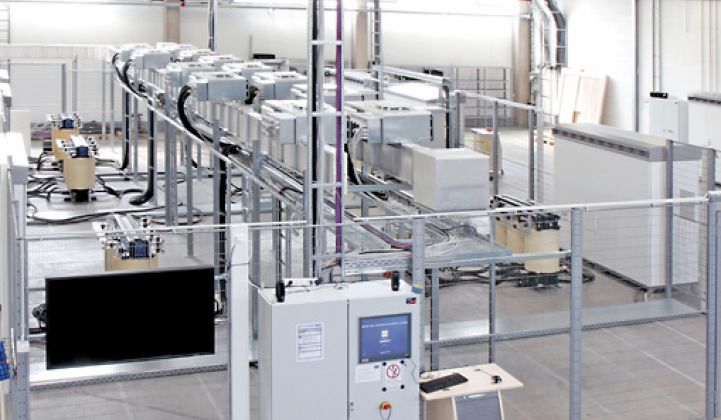Leading German inverter maker SMA is taking aim at the growing market for PV and diesel hybrid systems.
The company has built a new test center in Niestetal, Germany -- opened at the beginning of this year but announced last month -- to experiment with a variety of solar-powered hybrid systems.
“In addition to diesel generators, complete photovoltaic diesel hybrid systems also comprise [a] regenerative grid feed-in and a battery-storage system so that virtually all grid management services…can be covered in a standalone or utility grid," wrote the company in a press release.
The test center will allow SMA engineers to examine what happens to a hybrid power setup when the balance between different components is upset -- for example, as a result of a cable breakage or a surge in power demand. Technicians can even simulate different cable lengths, using variable resistors and impedance.
Diesel generation use is managed by an SMA product called the Fuel Save Controller, which can see when PV-powered batteries are running low and then ramp up production from gensets.
SMA credits the system with saving around 5,200 liters of diesel a day at a Bolivian hybrid plant, Cobija, a project combining 5.2 megawatts of PV and 2.2 megawatts of battery storage with 15.2 megawatts of genset power.
“The good thing for customers is that we can simulate errors in existing hybrid systems around the world immediately as soon as they occur on-site,” wrote SMA’s deputy head of testing, Jakob Issleib, in a blog posting. “This makes it possible to view and state what the problem is. The situation is then re-enacted in the testing center to solve a troubleshooting problem directly. This service is not available anywhere else.”
The center will also be used to validate new SMA systems, such as the company’s Sunny Central 2200 and 2500 grid-scale inverters.
SMA’s test bench was designed for a 1.6-megawatt generator and can accommodate systems big enough to supply hotel resorts or communities of up to around 18,000 people.
SMA says it can run performance tests with different configurations and load characteristics up to a total power output of approximately 5 megavolt-amperes.
“It would also be possible, however, to stimulate larger hybrid electricity supply scenarios for commercial loads, such as factories or warehouses, and for industrial uses in the power plant size, such as mining or industries producing raw materials,” Issleib wrote.
SMA estimates an annual global market in the gigawatt range for PV-diesel hybrid systems and has already worked on installations in South America, the Caribbean, Africa, India and the South Pacific.
“The most attractive markets we see today are in the sunbelt countries of the world,” said Volker Wachenfeld, executive vice president of the off-grid and storage business unit at SMA. “The two major prerequisites perfectly match in this region: a significant energy demand, mostly covered by diesel generation, and reliable solar irradiation on a level that allows optimal economics.”
A number of other technology developers are also targeting the hybrid market, although not all are contemplating battery storage alongside diesel at present.
Daniel Zywietz, founder and CEO of Enerwhere, a Dubai-based company that rents solar hybrid systems, said the cost of battery storage was still an issue in many diesel markets.
“Economically, short of having a load of development money to throw around, it’s insane,” he said. “It doesn’t make any sense. So at scale, at this point in time, storage doesn’t yet pay, with a few exceptions."
“If you are on an island in the Pacific or diesel is taxed to the max, you might be able to do it, but the reality is that for most applications, battery storage is still too expensive," said Zywietz.
SMA and others are betting that this situation will change as battery costs come down. The company's testing center will help prepare it for when the market takes off.



